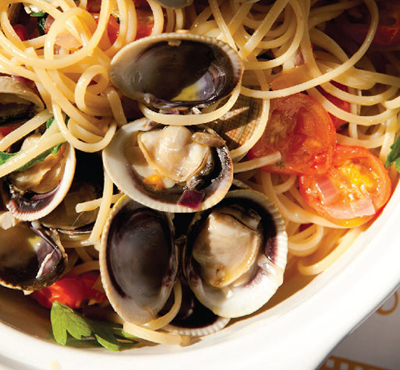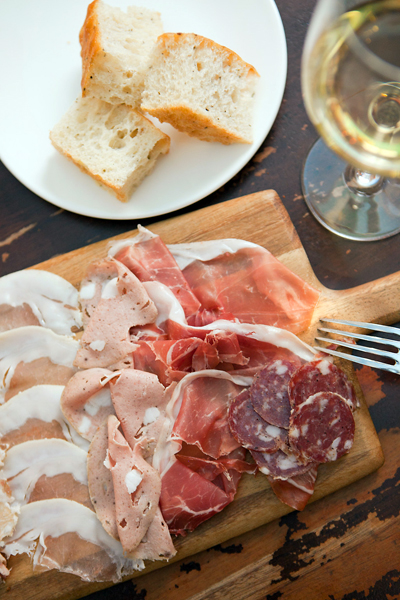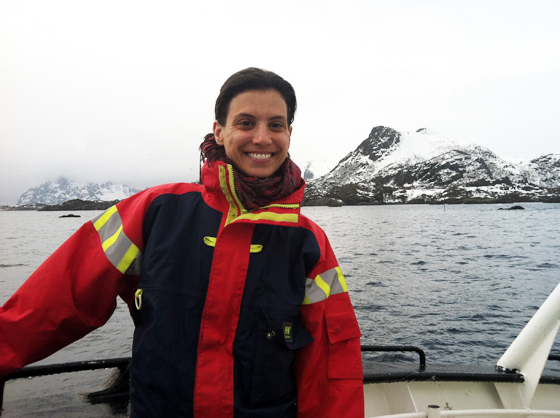Given this ruckus among the restaurant elite, it seems a good time to check in with the director of food safety and sustainability for the Batali & Bastianich Hospitality Group, a national restaurant empire that includes Babbo, Eataly, and Del Posto in New York City, and Osteria Mozza and Pizzeria Mozza in Los Angeles.

Sustainable seafood remains a hot-button issue for consumers and chefs. Photo: Kelly Campbell
Elizabeth Meltz, who talked about the green dining experience at Tedx Manhattan's "Changing The Way We Eat" last year, attended the recent Sustainable Foods Institute, a media conference that accompanies the Monterey Bay Aquarium’s Cooking for Solutions.
She shared her thoughts on the Post's pronouncements, serving sustainable meals, and the compostable container conundrum with Bay Area Bites this week.
What exactly does the director of food safety & sustainability for Batali & Bastianich do? What does a typical day look like?
If only there ever was a "typical day." Some days are totally dominated by food safety and others by sustainability, and sometimes entire weeks can focus on one or the other. For example, last month was focused heavily on finishing up Pizzeria Mozza Orange County's LEED Silver Certification, but come August and September our New York City restaurants start getting inspected again by the health department so I will be running around dealing with that.
Did you create your own position and how did you get into this line of work?
I did create my own job, and I highly recommend it. When it first opened in 2006, I was a line cook at Del Posto, Mario, Joe and Lidia's four star Italian restaurant in New York's Meat Packing District. I worked for the amazingly progressive genius executive chef Mark Ladner. We clicked and I transitioned out of the kitchen and into the office- creating a hodgepodge position of HR, executive assistant, green guru and food safety expert. The food safety and sustainability elements emerged as ones that were replicable and applicable to all of our restaurants (currently 18 in the US). Oh, and I'm a department of ONE.
Do you work with chefs, managers, front of the house, kitchen staff, wait crew -- or all of the above?
All of the above. Both food safety and sustainability only work if there is buy in from the entire staff. Chefs and managers help me implement the initial changes or trainings we might be doing or working on, but the commitment and enthusiasm from the staff -- including wait staff and dishwashers, is what carries the change.
Does your experience as a line cook help in your current job?
Having a kitchen background is a huge advantage in my current position -- because I've been there, I don't make absurd suggestions that I know won't work, and chefs usually appreciate that. I went to culinary school because I loved to cook but I swore I would never work in a kitchen outside of the required three month externship. Four years later I was still working in some of New York City's and Italy's best kitchens.

Where meat comes from -- and how it was raised -- is a top concern for many diners. Photo: Kelly Campbell
Chefs have reputations for strong opinions about what goes down in -- and comes out of -- their kitchens. How do you navigate that?
We are a chef-driven restaurant group so when it comes to sustainable food purchasing I make suggestions instead of issuing edicts. Luckily for me I work with a talented group of eco-minded chefs who are capable of balancing their commitment to the environment with making food that tastes good. As far as the food safety requirements and some of the non-food related green stuff, they know Mario and Joe wholeheartedly believe in it, so they are on board.
What kinds of things do you address on the food safety front: Is it all about food poisoning, sourcing reviews, and hygiene practices?
We comply fully with all local and state health department guidelines. My job is to keep up with these codes, keep the chefs and managers up to date, and then inspect, train, and reinforce. I track outbreaks and recalls and keep them abreast of these as well. We do food safety and food allergen training for front-of-house staff. We take these things seriously. Each restaurant is capable of dealing with the rare food poisoning concern, but if there ever is an issue that needs an extra hand, I deal with it.
What about the sustainability side of your job?
It's like vapor, it can expand endlessly, from testing a new electrolyzed water technology to investigating a hydroponic garden technology, to partnering with the New York Botanical Garden for Mario's edible garden beds. Each of our restaurants is a certified green restaurant (or is in the process of being certified), and maintaining that in and of itself can be a full-time job. You name it, it comes under my umbrella: Whether it's visiting our compost facility to make sure our waste is going where it should be going or screening the movie The End of the Line to our staff so they know what is happening to our oceans.
Consider: Fois gras, bluefin tuna, and factory-farmed meat. How do you handle such sustainability concerns?
As an almost all Italian restaurant group I don't have to deal with foie gras. Bluefin tuna is the only thing we actually banned our chefs from purchasing altogether (now that I just gave that whole spiel about how I never tell them what to do). I have since had some second thoughts about that as the fishermen who are going about procuring bluefin the correct way deserve support. Lastly, not a fan of industrially-raised meat. I cannot say we do not purchase any at all, but we purchase a great deal of our meat from Heritage Foods USA, and were one of the very first restaurant groups to do so.
What do you love about your job and what's challenging?
What's not to love? I love everything about it. To-go containers are challenging -- don't get me started. Each municipality accepts different items, the chasing arrows and the numbers on the bottom of the containers are totally misleading, compostable containers are only compostable in a compost facility and most cities won't pick up compost anyway, so what are you going to do with it? It makes me so mad.
What kind of skill set or personality do you need for a gig like yours?
The food safety part definitely requires that you tap into your inner nerd. I also think balance is really important, and understanding that sustainability isn't sexy all the time -- it's not all about solar panels. Sometimes it's about a boring faucet aerator.

Mario Batali. Photo: Melanie Dunea
Would you care to respond to the recent Batali-Bastianich bashing in the New York Post?
I'd like to clarify some points. Meatless Monday is not simply about adding vegetarian options to the menu (though that is the physical manifestation of it.) Meatless Monday is a message of moderation, reminding the world that the same chef who was famously photographed with sausage links around his neck was also photographed with kohlrabi on his head in TIME magazine. Going meatless once a week can reduce a person's risk for chronic preventable conditions like cardiovascular disease, diabetes and obesity. It can also help reduce an individual's carbon footprint and save resources like fresh water and fossil fuels.
The simple answer to Chef Keller’s question: “Is it really my responsibility to worry about carbon footprint?” is, YES. It is everyone's job to worry about sustainability. If he needs a more selfish motivation: he should worry because if he doesn't choose wisely ten years from now he won’t have any fish left with which to create his art.



